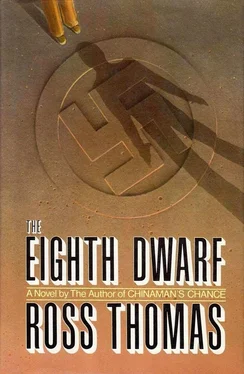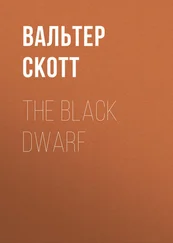“For Christ’s sake,” Fallon said.
The Walther was aimed at the German who said his name was Joachim Wiese. “We’re going to have a court-martial, Lieutenant,” Oppenheimer said. “It won’t take long. I will be the prosecution; you will be the judge; Corporal Little, I think, will be the defense counsel; and Private Baxter — let’s see — Private Baxter, yes, will be sergeant at arms.”
“What the fuck are you talking about?” Fallon said, and started to rise. Oppenheimer waved the gun at him, and he sat back down.
“I’m talking about friend Wiese here. You see, Lieutenant, his name is really not Wiese at all.” He smiled up at the German. “Tell them your real name.”
The German’s face was beginning to sweat. “I don’t understand,” he said. “My name is Wiese. I was a teacher. Then they sent me to Dachau. I almost died there. My wife, she... she did die.” He spread his hands imploringly. “I have proof — documents.”
“And very good documents, too. You bought them from a man called Damm — Karl-Heinz Damm — in Munich on June 2, 1945. You paid the equivalent of ten thousand dollars for them in Swiss francs. It was an excellent bargain.”
The German was afraid to move his body, so he only turned his head to look at Fallon. “I... I don’t understand any of this, Lieutenant. Can’t you do something? It is all some terrible mistake. You have seen my documents. Tell him that you have seen them.”
“I’ve seen them,” Fallon said in a flat voice.
“Good,” Oppenheimer said. “The judge has seen the documents, so we will stipulate that they have been entered as evidence. Now to get on with the prosecution. You see, Your Honor, the accused was not always an interpreter and was never, never a teacher of English or French or Latin. No, he was in a quite different business during the war — the slave-labor business. Would you care to tell us about the labor business?”
The German shook his head vigorously. The pink had gone from his face. It was now a chalkish white. “I don’t understand,” he said. “I don’t understand any of this.”
“No? You have never heard the name Oskar Gerwinat?”
Again the German shook his head. “No. Never.”
“Strange. Well, Oskar Gerwinat was in the slave-labor business. He was a contractor. By that I mean he was given contracts to feed and house the slave laborers. Well, Herr Gerwinat was an excellent businessman. He soon discovered that the less he fed his charges, the more profitable his business. If they died, from exposure or overwork or hunger, well, no matter. There were always many more where they came from: Poland, France, Holland — places like that. Herr Gerwinat was not the largest contractor in his particular field, but he had a very nice little business going, mainly in the Ruhr area. The most reliable figures estimate that two thousand three hundred fifty-four of Herr Gerwinat’s charges died from hunger or exposure or overwork — or sometimes, I would assume, all three. Now are you quite sure you have never heard of Oskar Gerwinat?”
The man charged with being Oskar Gerwinat was trembling now. “Never,” he said, and sounded as though he were choking on something. “It’s all a mistake — a terrible mistake.”
“The prosecution will now introduce new evidence,” Oppenheimer said. He took from his pocket one of the sheets that he had torn from Damm’s ledgerlike book and, without taking his eyes from the German, handed it to Fallon.
Fallon looked at it. “Hell, this is in German. I can’t read this.”
“The photograph that’s pasted on the page.”
“There’re two photos.”
“The top one.”
“Yeah, that one’s Wiese, all right.”
“Taken through a window, wouldn’t you say? But still, quite a fair likeness.”
“Yeah, it’s him, all right.”
“Now we will have the interpreter translate the evidence into English for you, Your Honor. If you’d be so kind as to hand it to him.”
The German accepted the sheet of paper and looked at it As he read, his face crumpled up so that with his nearly bald head he looked very much like a wizened infant about to cry. Then the tears did start. He sniffed, shook his head, and silently handed the sheet back to Oppenheimer.
“No? Well, there is really nothing much more here, Your Honor, than what I’ve already told you. These are the notes that a very meticulous blackmailer made for future use. But if you think that it would serve the course of justice, I will—”
“No,” the German said, and sank to his knees. The tears were still running down his face. In German he said, “Yes, yes, it’s true. It’s all true. I am Oskar Gerwinat I—”
“What’s he saying?” Fallon said.
“He just confessed that he is Oskar Gerwinat.”
“Is that what you said, Wiese?”
Wiese-Gerwinat, his head bowed, muttered, “Yes.”
“Jesus,” Fallon said.
“The accused has admitted his guilt,” Oppenheimer said with a cheerful smile, “but I do think we should still hear from defense counsel. Corporal Little?”
“Gosh, Lieutenant” Little said to Fallon. “What am I supposed to say?”
“Nothing. You’re supposed to say nothing.”
“Well, I could say that he’s always been a pretty nice old guy around here.”
“Shut the fuck up, will you Little?”
“Yes, sir.”
“Now, look,” Fallon said to Oppenheimer. “I don’t know who the hell you are, buddy, but—”
The German lunged for the Walther before Fallon could finish. Oppenheimer stepped back quickly and shot him twice in the chest. The German fell back down to his knees, whimpered something, then sprawled heavily on the floor. He twitched several times before dying.
“Jesus Christ,” Fallon whispered.
“He shot him, Lieutenant,” Private Baxter said in a shocked voice. “He just hauled off and shot him.”
“It’s... it’s like a play,” said Corporal Little, who had spent a year at the University of Nebraska and was already at work on a novel about his experiences in postwar Germany. He immediately resolved to scrap what he had written and start afresh. Staring at Oppenheimer, he began to make careful mental notes.
Oppenheimer gazed down at the dead Oskar Gerwinat for a moment and looked up at Fallon. “He really deserved it, you know.”
Fallon shook his head. “You’re crazy, fella.”
Oppenheimer nodded. “Probably. Now, one of you will have to come with me for a while. Which one shall it be?”
Fallon’s quick mind immediately sensed what Oppenheimer needed. “You’re taking a hostage, right?”
“Only for a while.”
“I’ll go.”
“No, Lieutenant, I think not. You’re a bit too quick for me. I’m afraid.”
“Let me go, Lieutenant,” Corporal Little said, anxious not to miss anything that might prove useful to his literary career.
Oppenheimer nodded again. “Can you drive a jeep, Corporal?”
“Sure.”
“Good. You’ll be back within two hours — provided that the Lieutenant doesn’t make any calls for an hour.”
“No calls,” Fallon said.
“Good.”
Fallon frowned. “Let me ask you something.”
“Of course.”
“Are you really an American?”
“Would it make any difference?”
Fallon shook his head slowly. “No, not a hell of a lot, I guess. You’re not going to hurt the kid, though, are you, if I don’t make any calls for an hour?”
“No, I won’t hurt him,” Oppenheimer said. He turned to Little. “Are you ready, Corporal?”
“You bet,” Corporal Little said.
They were expecting the jeep at the rear entrance to the Displaced Persons camp at Badenhausen. Within three hours after Oppenheimer drove it in, the jeep would be completely disassembled and its parts sold on the black market.
Читать дальше












